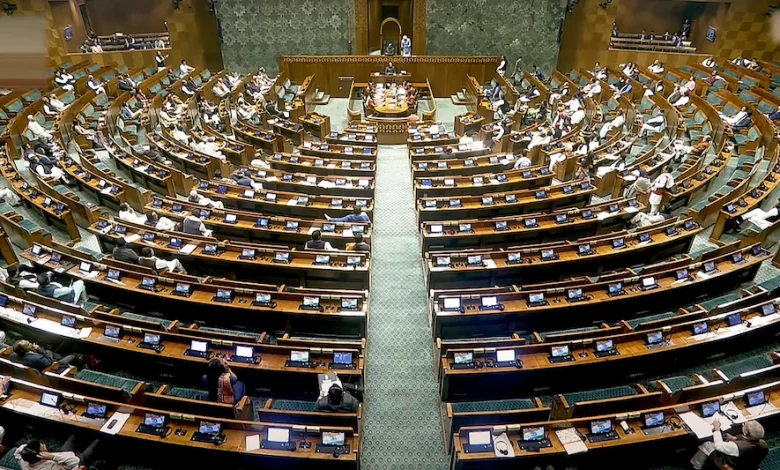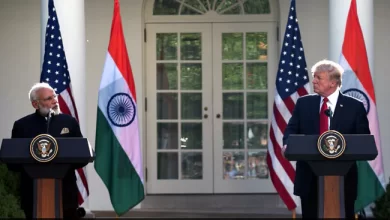
One Nation, One Election Bills Introduced In Lok Sabha; 269 Members Vote In Favour, 198 Oppose
Two bills that lay down the mechanism to hold simultaneous elections – The Constitution (One Hundred and Twenty-Ninth Amendment) Bill, 2024′ and ‘The Union Territories Laws (Amendment) Bill, 2024’, were formally introduced in the Lok Sabha on Tuesday, amid a fiery debate.
The bills, that propose ‘One Nation, One Election’, or simultaneous elections to both Lok Sabha and state assemblies, will now be sent to a Joint Parliamentary Committee (JPC) for detailed discussions.
As the Opposition dubbed the bills as an attack on the federal structure, the government rejected the charge, and subsequently, the bills were introduced with 269 members voting in favour and 198 against it.
This was the first time that the electronic voting system was used in the Lok Sabha in the new Parliament House.
The proceedings were later adjourned for a little over an hour.
Following the votes, Law Minister Arjun Ram Meghwal formally introduced the Constitution (129th Amendment) Bill, 2024, on ‘One Nation, One Election’ and agreed to send the bill to the JPC, in response to Union Home Minister Amit Shah’s statement.
Speaking in the Lok Sabha, Amit Shah said, “When the One Nation, One Election Bill was taken up in the cabinet for approval, Prime Minister Narendra Modi had said that it should be sent to the JPC for detailed discussion. If the Law Minister is willing to send the bill to JPC, the discussion on its introduction can end.”
Meghwal also introduced a bill to amend the Government of Union Territories Act, 1963, the Government of National Capital Territory of Delhi Act, 1991, and the Jammu and Kashmir Reorganisation Act, 2019, as per the day’s schedule.
These amendments aim to align assembly elections in Delhi, Jammu Kashmir, and Puducherry with the proposed simultaneous elections.
ONE NATION, ONE ELECTION BILL IN LOK SABHA
Following the introduction of the bills, Congress MP Manish Tewari opposed the move, arguing, “Beyond the seventh schedule of the Constitution is the basic structure doctrine, which spells out that there are certain features of the Constitution beyond the amending power of the House. The essential features are federalism and the structure of our democracy.”
“Therefore, the bills moved by the Minister of Law and Justice are an absolute assault on the basic structure of the Constitution and are beyond the legislative competence of the House,” Tewari said.
DMK MP TR Baalu also opposed the Bill, stating, “I oppose the 129th Constitution Amendment Bill, 2024. As my leader (Tamil Nadu Chief Minister) MK Stalin has said, it is anti-federal. The electors have the right to elect the government for five years, and this right cannot be curtailed with simultaneous elections.”
Samajwadi Party MP Dharmendra Yadav, echoing sentiments expressed by other INDIA bloc members, said, “I am standing to oppose the 129th Amendment Act of the Constitution. I cannot understand how, just two days ago, no stone was left unturned to uphold the glorious tradition of saving the Constitution. Within two days, this Constitution Amendment Bill has been brought to undermine the basic spirit and structure of the Constitution.”
“I agree with Manish Tewari, and on behalf of my party and my leader Akhilesh Yadav, I have no hesitation in saying that there was no one more learned than the makers of our Constitution at that time. Even in this House, there is no one more learned. I have no hesitation in saying this,” he added.
Trinamool Congress MP Kalyan Banerjee in the Lok Sabha said, “This proposed Bill hits the basic structure of the Constitution itself and if any bill affects the basic structure of the Constitution, it is ultra vires. We must remember that the state government and the state legislative assembly are not subordinate to the central government or Parliament.”
“This Parliament has the power to legislate law under the Seventh Schedule, List One and List Three. Similarly, the state assembly has the power to legislate law under the Seventh Schedule, List Two and also List Three. Therefore, by this process, the autonomy of the state legislative assembly is being taken away,” he said.





